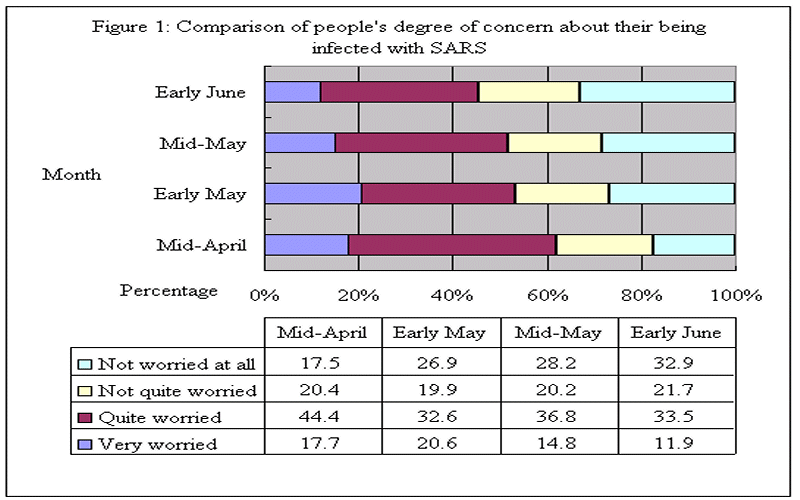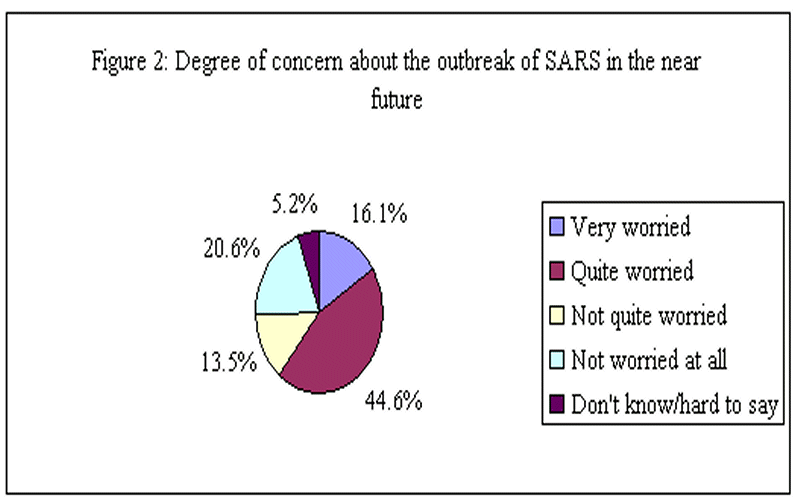Back
|
Boris Sai-Tsang Choy (College Lecturer of the HKU SPACE Community College) |
|
|
Translated by Bernard Cheung (College Lecturer of the HKU SPACE Community College) |
|
|
Note: This article represents the view of the author and not the University of Hong Kong. |
|
|
SARS has wreaked havoc in Hong Kong for more than three months. But with the admirable efforts of health workers and various members of the community, together with a heightened awareness of personal and communal hygiene among the citizens, Hong Kong has just been removed from WHO's list of SARS affected areas. Hong Kong is now back on its feet. With the government helping to revive the local tourist industry, it is hoped that visitors from the mainland and other regions will soon return to Hong Kong in droves thus helping to kick-start the suffering economy, and ease the worrying trend of unemployment. |
|
|
The Public Opinion Programme of the University of Hong Kong carried out random telephone surveys on people's opinions on SARS in mid-April, early- and mid-May, and early June. Each survey successfully interviewed over 1,000 citizens aged above 18, and the overall response rate was over 65%. As shown in Figure 1, the percentage of respondents who were 'very worried' and 'quite worried' recorded a drop from 62% in April to 45% in June. At the same time, the percentage of respondents who were not worried increased gradually from 38% to 55%. This shows a collective sigh of relief and an expectation of a return to normal life. However it must be noted that more than half of the respondents in the June survey showed worries about SARS, more than 10% were 'very worried' while only 33% were 'not worried at all'. Whether such a level of "alertness" is appropriate or not would better be left for our health workers to investigate. |
|
|
The SARS episode seems to be drawing to a close, but whether it will resurface remains unclear. The findings in early June (Figure 2) show that 16% of the respondents were 'very worried', and 45% were 'quite worried', while 5% were in the category of 'don't know / hard to say'. Clearly, people are concerned about SARS resurfacing. Members of the community should be more careful about personal and communal hygiene. And the Hong Kong government should earnestly promote civic education, and act decisively in the face of similar crises in the future. |
|
|
The opinion on the government's handling of the crisis was unflattering - a modest score of 53.7 marks out of 100 was recorded in the early June survey. The writer will not comment on the performance of individual government officials as he believes the readers should already have formed an opinion on how well they performed. The central government and the Taiwan officials on the other hand coped with the crisis rather differently. Respectively they scored 48.9 and 40.7 marks (see Table 1). But as the seriousness and peak periods of the disease varied among different regions, these data serve only as references at best. For instance, the central government handled the crisis in Beijing with higher degree of transparency, and proved to be resolute in containing the spread of the disease. Hence, it should garner a higher rating in the days to come. |
|
|
We might have won the battle against SARS, but we should not let down our guard. Toronto, where the disease was allowed a chance to recur, is a case in point. |
|
|
Note 1: In the first survey, 1,021 people were interviewed between 16 and 23 April; the overall response rate was 68.9%. In the second survey, 1,008 people were interviewed between 2 and 7 May; the overall response rate was 66.2%. In the third interview, 1,067 people were interviewed between 15 and 20 May; the overall response rate was 65.1%. In the fourth interview, 1,027 people were interviewed between 3 and 6 June; the overall response rate was 66.6% |
|


Table 1: People's rating on the governments' performance on SARS
| Area | Hong Kong | Mainland China | Taiwan |
| Mean | 53.7 | 48.9 | 40.7 |
| Standard error | 0.61 | 0.69 | 0.66 |
| Effective sample size | 1007 | 937 | 861 |